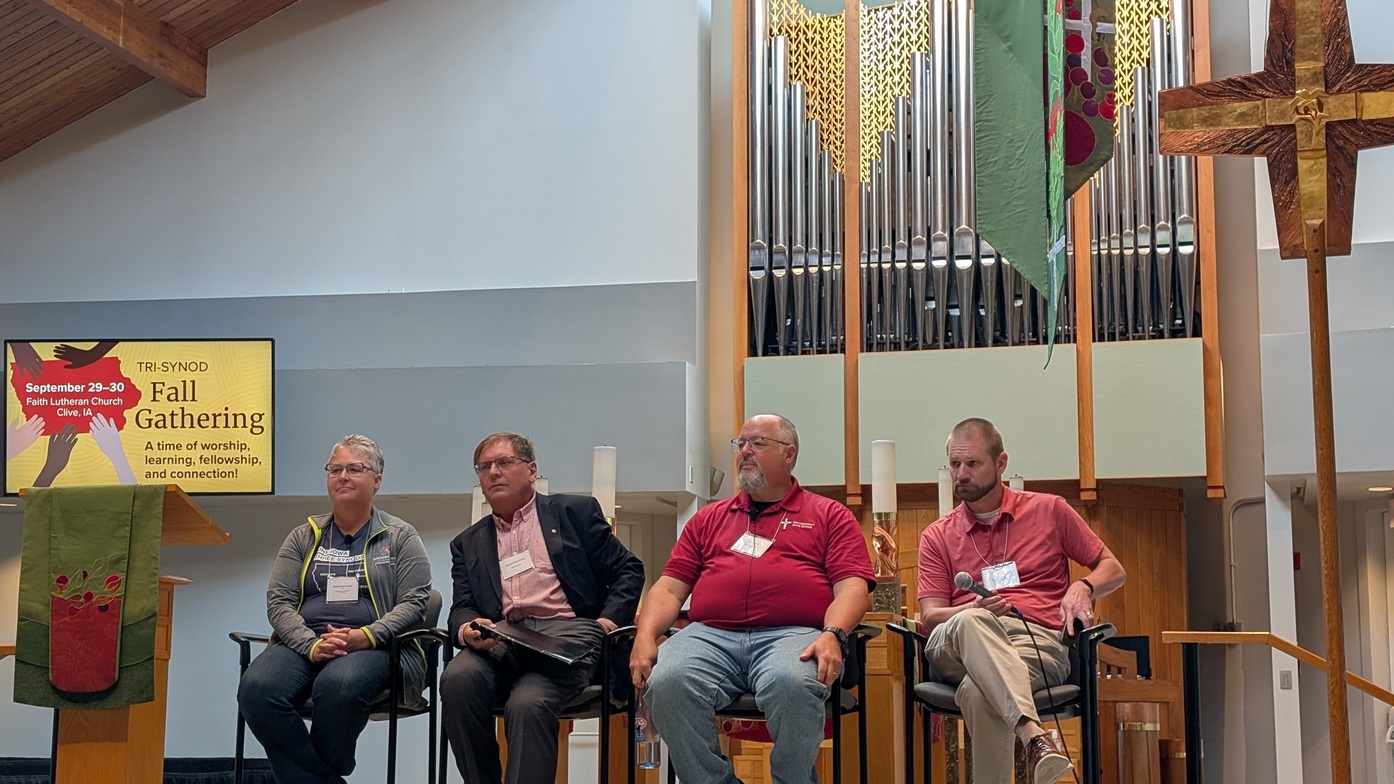
Pictured above, left to right: Bishop Amy Current (Southeastern Iowa Synod), Bishop Tamás Fabiny (Northern Diocese of the Evangelical Lutheran Church in Hungary), Bishop Kevin Jones (Northeastern Iowa Synod), Bishop Scott Dalen (Western Iowa Synod)
“Inside, there was my baptism, and outside, there was propaganda and fear.”
This is how Rev. Dr. Bishop Tamás Fabiny, the bishop of the Northern Diocese of the Evangelical Lutheran Church in Hungary, introduced himself to Lutheran pastors and deacons from all three Iowa Lutheran Synods. By telling the story of his baptism.
Bishop Fabiny was born in 1959, during the Cold War, in Hungary, a country behind the Iron Curtain occupied by Soviet Russia. He returned again and again to his image – love, truth, and community inside and lies, fear, and violence outside – as a symbol of what it means to be the Lutheran church in Hungary.
He told us about Lutheran Bishop Lajos Ordass, a hero who suffered and was imprisoned during the Nazi and Soviet occupations of Hungary. Born Lajos Wolf (a German name) he changed it to Ordass (Hungarian for “wolf”), to protest Nazi Germany’s invasion of Hungary in 1944. He soon began forging baptismal documents for Hungarian Jews to save them from the death camps of Auschwitz-Birkenau and Buchenwald. This was a great personal risk, because some pastors who expressed solidarity with Jews were sent to the death camps themselves. Later, in the years just before Bishop Fabiny was born and baptized, Bishop Ordass was imprisoned by the Soviets for criticizing their occupation of Hungary. Ordass observed that those who were critical of fascists were also critical of communists, while those who cooperated with fascists also cooperated with communists.
Hungarian Lutherans cherished their Theology of Diakonia (New Testament word for loving service). But the communist regime twisted it to mean serving the communists. “The word diakonia,” Bishop Fabiny said, “had to be cleansed.” Today many, including the Christian Democratic government in Hungary, misuse theological words and biblical images. They use Christian words as political words, for political ends. They give simplistic, emotionally-charged answers and do not respect others, like the Roma people and refugees from the Middle East and Africa.
Hungarian Lutherans take action to stand in solidarity with the Roma after right-wing violence against them and to offer refugees solidarity, love, and welcome. Bishop Fabiny works for unity, confronting extremists on the right and the left. He tells them to stop using the Bible and to stop claiming they are Christian. He sees great danger in the church becoming a servant of politics. The Hungarian government offers money and favors in order to silence legitimate criticism. The Hungarian Lutheran church pays a real cost to exercise its freedom in Christ, speak truth, serve the neighbor, and resist populism. Bishop Fabiny is himself criticized by his own people.
Martin Luther’s theology of the cross helps us resist the temptation of glory offered by the state, he said. Much more can be said about it, but the theology of the cross is, in short, this. We are stuck in a world where suffering knows no end. No carefully lived life or pure ideology or pile of money or right government or anything else lets us escape or avoid suffering. Christ’s cross clears away the illusions of our idolatries and our pretensions to success and glory. The cross shows reality to be the evil it is. And more, the cross is God’s radical act of mercy and love in Jesus Christ to join us in it and so to redeem us.
“We are a proud minority church,” Bishop Fabiny said and went on to use that phrase many times–”minority church.” As if to say that, despite the temptation to power struggles over control of politics and culture, the church is and always will be like yeast in bread dough. In the minority for the sake of love, boasting only in Christ and his cross. -PC
